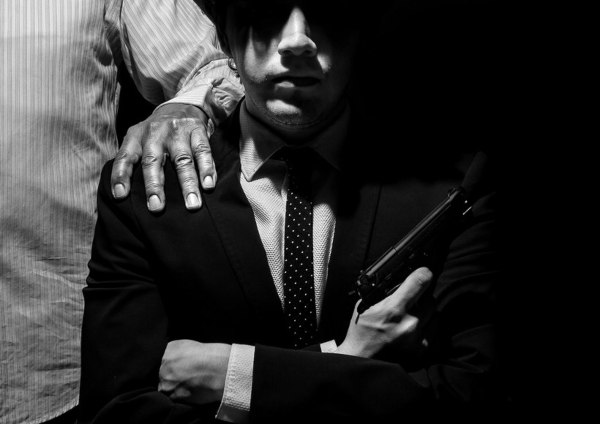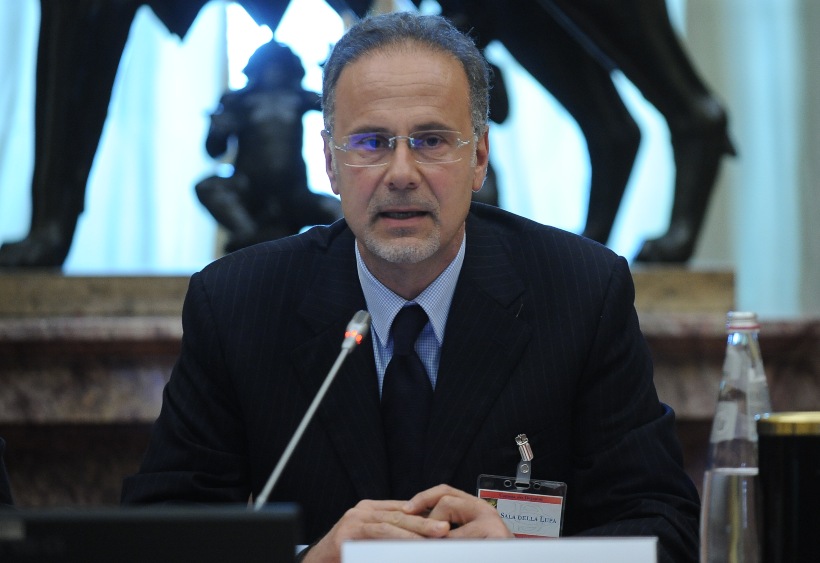// Interview: Giuseppe Spadaro
Judge, President of the Juvenile Court of Bologna, Former President of the Lamezia Terme District Court Criminal Section, Italy
JT: Could you tell us about your involvement in the fight against organised crime in Italy? You live under guard; how did it happen?
GS: The question refers to my previous position. To be frank, I can say that I cut my teeth as President of the Criminal Section of the Court of Lamezia Terme in Calabria.
In that capacity, I judged dozens of mafiosi. Obviously, I still remember the tense hearings well, the ferocious looks of the godfathers, the very hard clashes with the lawyers of the bosses, the deterrent sentences which inflicted hard blows on the local cosche.
As can be imagined, it’s still not easy for me, even from an emotional point of view, to recall the days when I became aware of the organised hit that I had been warned about. I never knew if it was true, but it seems that everything was ready: fake policemen would stop me at a checkpoint on the road from Catanzaro to Lamezia Terme and when the driver lowered the window, it was planned that… I don’t know, believe me, I don’t even want to think about it… because it was on Christmas Eve and my two daughters were also in the armoured car!
It’s a closed chapter, now I am devoted with greater momentum and conviction to helping the boys who make mistakes get back on their feet, as well as trying to save the youngest and defenceless from the violence and mistreatment of adults who are often so irresponsible.
JT: What is the estimated range of action and influence of ‘Ndrangheta, and what characterises it?
GS: The Calabrian ‘Ndrangheta does not have the fame of Cosa Nostra or of the Camorra, but today it has ramifications in every Italian region and across the five continents. It can boast relations with the highest-level foreign criminal and terrorist organisations and it is one of the main ones responsible for the immense flood of cocaine that has invaded Italian cities, and not only in the last few years.
According to recent estimates, its total turnover amounts to more than 40 billion dollars. An outcome that is the result of an extraordinary ability to adapt to every market need, to combine tradition and modernity but without erasing the presence of ancient rituals, perhaps readapted, but never completely disappeared. A symbolic universe that may seem bizarre or delusional, but, in reality, it is functional for the preservation of an identity to be affirmed in every place and on every occasion.
In perhaps his best-known book Fratelli di sangue, my very good colleague Dr. Gratteri, the current Prosecutor of the Republic of Catanzaro, my city, reconstructs and describes a shockingly pervasive and brutal criminal universe from the historical and environmental point of view in an extraordinary way.
Compared to the other mafias, the ‘Ndrangheta is probably richer than Cosa Nostra. It is powerful, incisive, has international ramifications, but it doesn’t make headlines. This organisation has managed to strengthen itself in secrecy, without ever failing to comply with its own characteristics, rules and values, such as silence and blood ties.
It has been the undisputed leader in cocaine trafficking from South America to Europe for some decades, but, for many, it continues to be an archaic version of the Sicilian mafia, a typical phenomenon of backwardness, confined in Calabria in the feuding monoculture.
JT: Is there a similarity between the mafia sons and young jihadists?
GS: In the book Rinnega tuo padre, which I had the opportunity to present in Bologna, Giovanni Tizian, an important Italian journalist who was in turn a victim of ‘Ndrangheta, collected stories from adolescents who had joined the internationally known project called Liberi di scegliere e allontanati dai boss di ‘Ndrangheta (free to choose and removed from the ‘Ndrangheta bosses), thanks to the intervention of the Juvenile Court of Reggio Calabria.
The educational degradation to which these children are subjected has been understood as the transmission of mafia values and, therefore, treated as a physical abuse in the forfeiture of parental responsibility.
Their stories recall the biographies of many young people I met in my experience as a juvenile magistrate in Calabria, who entered the limbo of the deviated honour of the criminal organisation, young people who were taught to use weapons, to hide cocaine, teenagers who are asked to get rid of the enemy.
The males are raised just like ISIS soldiers, their days filled with brainwashing and military training, while the females must stay in their place and prepare for the role of maids, mothers and servants.
Many young people have escaped this nightmare thanks to their mothers, “white widows” and single women because their husbands went to prison, just like the single mothers and widows of ISIS.
Only a few years ago they didn’t trust the State, they didn’t know that there was this option, now they see the results.
[About the Mafia's children] The males are raised just like ISIS soldiers, their days filled with brainwashing and military training, while the females must stay in their place and prepare for the role of maids, mothers and servants.
JT: Can you explain in detail how “de-radicalisation” works in the mafia environment that could also be applied to jihadist families?
GS: We know that, first in France and then in England, the so-called de-radicalisation was intended as a guided re-educational path within the Islamic religious experience, conducted with the help of an Imam, to understand the real roots of this religious belief and allow the rehabilitating subject to consciously shy away from any distorted logic and use of the Islamic religion and its behavioural precepts. Despite the discouraging results, the European Union’s commitment in this direction, with de-radicalisation programmes with an intercultural and interreligious approach, is well known.
In our country, this solution provides food for thought and is also proposed with regard to the compatibility of such a “catechetical” system with the principle of the secular nature of the State, taking into account, however, that the subjects who choose to be included in the international terrorist structure are not always driven by religious belief.
However, the similarity with the mafia can be established in relation to the categories of family belonging of children and parental responsibility and it is the subject of in-depth study and research. The main reference is still to the above mentioned Liberi di scegliere (Free to choose) project, which finances individual education courses aimed at minors, in order to provide them with a valid alternative to the social context strongly characterised by a mafia culture. It includes the activation of specialised teams to provide the recipients with the necessary support to favour life choices which are foreign to the criminal dynamics of the regions of birth.
JT: As far as juvenile crime linked to organised crime is concerned, how is the Italian prison system?
GS: Considering the specialisation of this important publication in the prison field, I would like to review and further explore the announcement made by the Head of the Department of Juvenile Justice and Community, Dr. Tuccillo, in her interview on the approval of the law on the new prison system for minors, approved in October last year.
The perspective offered by the reform is that of a “child-friendly” criminal justice, according to the Beijing Rules, the UN Convention on the Rights of the Child and the European Convention on the Exercise of Children’s Rights.
In fact, for the first time in Italy, the execution of sentences against convicted minors (for crimes committed when they were minors) has been regulated in an organic manner and for some innovative profiles, with significant changes being introduced especially with regard to alternative measures to detention and which takes into account the formation of their personality.
The recognition that every child has a history of their own that must be assessed on a case-by-case basis, that access to community measures, release on temporary licence and to outside work must be able to be independent of the type of crime, and the extent of the sentence is a significant outcome that allows the judge to give the children an extra chance, so that they can change, and it is our duty to make this possible.
I point out that with the use of the term “community” by the legislator instead of “alternative”, the community is directly involved in the recovery and inclusion project of the convicted person with the creation of an open and inclusive enforcement system towards minors.

In particular, from my point of view, I would like to emphasize the novelty of allowing restorative justice and mediation paths with the victims of crime as one of the key principles of the entire regulatory framework. Their importance is often overlooked in previous legislation, also because of their very difficult implementation, or at most delegated to optional activities left to the goodwill of juvenile offenders.
Another important innovation is the regulation of interviews and the protection of affectivity, which greatly widens the possibility of contact with the outside world and, in particular, with the figures which represent a solid and positive reference for the minor, both from the affective and educational point of view, where they exist. This enhanced protection of the right to affectivity is provided in practice by the institution of extended visits with family members or other persons with whom there is a significant emotional bond within well-equipped spaces in institutions, which allow the preparation and consumption of meals and which reproduce an environment similar to family life as much as possible.
It seems to me that this offers a glimpse of everyday family life in an environment where personal relationships struggle to carve out spaces of normality.
If the detainee, even those convicted for serious organised crime, has years later carried out an inner journey of repentance and distance (…) why not reassess his position?
JT: What is your opinion about the detention of members of organised crime? What role do prison sentences play?
GS: Well, it may seem strange and excessive, but I think that even the prison system for adults should be reviewed by the Legislator and new tools should be provided to the judicial oversight and the prison administration.
For example, if the detainee, even those convicted for serious organised crime, has years later carried out an inner journey of repentance and distance from the underworld, thanks to highly qualified staff in prisons, and has rejected that life model based on erroneous values, indeed social disvalues, why not reassess his position perhaps allowing him to give evidence in legality projects? Or allow him to undertake mediation procedures with the victims of crime and their families? Why not offer their families social support to prevent their children, brothers and wives from continuing in the footsteps of illegality taken by the detainee?
Only in this way will the young people from certain social contexts, in particular the towns of Aspromonte or Crotonese or Vibonese etc., find that they are simple men who recognise that they have made very serious mistakes instead of thinking that these are “myths” from which to take as an example by undertaking paths of illegality and affiliation to the ‘Ndrangheta!
Only in this way will the victims of extortion or other serious crimes see their “executioners” in the face but, precisely, with a different face, the result of years of imprisonment but also the recognition of the suffering caused to the victims!
Ultimately, this is the only way that the sentence can play an effective role in re-education and at the same time prison will not be a place to “be stationed” waiting for the return to freedom and then, perhaps, indeed often, repeat the criminal conduct with even greater criminal depth. And, mainly, only in this way we can return different and better people to civil society at the end of their sentences!
I believe that offering chances, opportunities for effective repentance, of re-elaboration of one’s own illicit conduct, however serious, are real “life opportunities” which I’m not saying are for everyone, but probably many ‘Ndrangheta men would not let them slip away… and certainly not for reasons of opportunity, as often happens for the so-called collaborators of justice or repentants, who, in the first phase of the preliminary investigations, “collaborate” when first arrested to obtain reduced sentences because they would be people who, only after a substantial period of deprivation of liberty, would not “do” the repentants but “would” effectively repent!
//
Giuseppe Spadaro took office as president of the Juvenile Court of Emilia-Romagna, in Bologna, in September 2013. He entered the judiciary in 1990, was a juvenile judge in Catanzaro – his native city – for nine years. From July 2007 was president of the Lamezia Terme court criminal section, in Calabria. In this latter capacity, he received threats, allegedly perpetrated by members of the ’Ndrangheta mafia. Judge Spadaro is described as very sensitive towards family law and juvenile justice issues.


